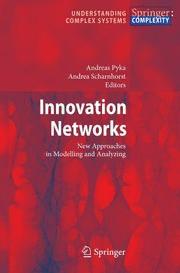
Innovation Networks [electronic resource] : New Approaches in Modelling and Analyzing PDF
Preview Innovation Networks [electronic resource] : New Approaches in Modelling and Analyzing
Springer Complexity Springer Complexity is an interdisciplinary program publishing the best research and academic-level teaching on both fundamental and applied aspects of complex systems – cutting across all traditional disciplines of the natural and life sciences, engineering,economics,medicine,neuroscience,socialandcomputerscience. ComplexSystemsaresystemsthatcomprisemanyinteractingpartswiththeabil- itytogenerateanewqualityofmacroscopiccollectivebehaviorthemanifestations ofwhicharethespontaneousformationofdistinctivetemporal,spatialorfunctional structures. Models of such systems can be successfully mapped onto quite diverse “real-life” situations like the climate, the coherent emission of light from lasers, chemical reaction-diffusion systems, biological cellular networks, the dynamics of stockmarketsandoftheinternet,earthquakestatisticsandprediction,freewaytraf- fic, the human brain, or the formation of opinions in social systems, to name just someofthepopularapplications. Although their scope and methodologies overlap somewhat, one can distinguish thefollowing mainconcepts and tools:self-organization, nonlinear dynamics, syn- ergetics, turbulence, dynamical systems, catastrophes, instabilities, stochastic pro- cesses,chaos,graphsandnetworks,cellularautomata,adaptivesystems,genetical- gorithmsandcomputationalintelligence. The two major book publication platforms of the Springer Complexity program arethemonographseries“UnderstandingComplexSystems”focusingonthevari- ous applications of complexity, and the “Springer Series in Synergetics”, which is devoted to the quantitative theoretical and methodological foundations. In addition tothebooksinthesetwocoreseries,theprogramalsoincorporatesindividualtitles rangingfromtextbookstomajorreferenceworks. EditorialandProgrammeAdvisoryBoard Pe´terE´rdi CenterforComplexSystemsStudies,KalamazooCollege,USAandHungarianAcademyofSciences,Budapest, Hungary KarlFriston InstituteofCognitiveNeuroscience,UniversityCollegeLondon,London,UK HermannHaken CenterofSynergetics,UniversityofStuttgart,Stuttgart,Germany JanuszKacprzyk SystemResearch,PolishAcademyofSciences,Warsaw,Poland ScottKelso CenterforComplexSystemsandBrainSciences,FloridaAtlanticUniversity,BocaRaton,USA Ju¨rgenKurths PotsdamInstituteforClimateImpactResearch(PIK),Potsdam,Germany LindaReichl CenterforComplexQuantumSystems,UniversityofTexas,Austin,USA PeterSchuster TheoreticalChemistryandStructuralBiology,UniversityofVienna,Vienna,Austria FrankSchweitzer SystemDesign,ETHZu¨rich,Zu¨rich,Switzerland DidierSornette EntrepreneurialRisk,ETHZu¨rich,Zu¨rich,Switzerland Understanding Complex Systems FoundingEditor:J.A.ScottKelso Future scientific and technological developments in many fields will necessarily depend upon coming to grips with complex systems. Such systems are complex in both their composition – typically many different kinds of components interacting simultaneouslyandnonlinearlywitheachotherandtheirenvironmentsonmultiple levels–andintherichdiversityofbehaviorofwhichtheyarecapable. The Springer Series in Understanding Complex Systems series (UCS) promotes new strategies and paradigms for understanding and realizing applications of com- plex systems research in a wide variety of fields and endeavors. UCS is explicitly transdisciplinary. It has three main goals: First, to elaborate the concepts, methods andtoolsofcomplexsystemsatalllevelsofdescriptionandinallscientificfields, especiallynewlyemergingareaswithinthelife,social,behavioral,economic,neuro- andcognitivesciences(andderivativesthereof);second,toencouragenovelapplica- tionsoftheseideasinvariousfieldsofengineeringandcomputationsuchasrobotics, nano-technologyandinformatics;third,toprovideasingleforumwithinwhichcom- monalities and differences in the workings of complex systems may be discerned, henceleadingtodeeperinsightandunderstanding. UCS will publish monographs, lecture notes and selected edited contributions aimedatcommunicatingnewfindingstoalargemultidisciplinaryaudience. · Andreas Pyka Andrea Scharnhorst Editors Innovation Networks New Approaches in Modelling and Analyzing 123 Editors Prof.Dr.AndreasPyka Dr.AndreaScharnhorst Universita¨tBremen RoyalNetherlandsAcademy FBWirtschaftswissenschaften ofArts&Science LSfu¨rWirtschaftstheorie VirtualKnowledgeStudio Hochschulring4 JoanMuyskenweg25 28359Bremen 1090HCAmsterdam Germany Netherlands [email protected] [email protected] [email protected] ISSN 1860-0832 e-ISSN 1860-0840 ISBN 978-3-540-92266-7 e-ISBN 978-3-540-92267-4 DOI 10.1007/978-3-540-92267-4 SpringerDordrechtHeidelbergLondonNewYork LibraryofCongressControlNumber:2009920221 (cid:2)c Springer-VerlagBerlinHeidelberg2009 Thisworkissubjecttocopyright.Allrightsarereserved,whetherthewholeorpartofthematerialis concerned,specificallytherightsoftranslation,reprinting,reuseofillustrations,recitation,broadcasting, reproductiononmicrofilmorinanyotherway,andstorageindatabanks.Duplicationofthispublication orpartsthereofispermittedonlyundertheprovisionsoftheGermanCopyrightLawofSeptember9, 1965,initscurrentversion,andpermissionforusemustalwaysbeobtainedfromSpringer.Violations areliabletoprosecutionundertheGermanCopyrightLaw. Theuseofgeneraldescriptivenames,registerednames,trademarks,etc.inthispublicationdoesnot imply,evenintheabsenceofaspecificstatement,thatsuchnamesareexemptfromtherelevantprotective lawsandregulationsandthereforefreeforgeneraluse. Coverdesign:WMXDesignGmbH,Heidelberg Printedonacid-freepaper SpringerispartofSpringerScience+BusinessMedia(www.springer.com) Acknowledgments The authors wish to thank Wouter de Nooy, Loet Leydesdorff and Krzysztof Sucheckifortheirhelpfulcomments.PartofthisbookisanoutcomeoftheCritical Events in Evolving Networks (CREEN) project, funded by the EU under its 6th Framework,NEST-2003-Path-1,012684. v Contents 1 Introduction: Network Perspectives on Innovations: Innovative Networks–NetworkInnovation .................................. 1 AndreasPykaandAndreaScharnhorst PartI InnovationNetworksinEconomics 2 KnowledgeNetworks:StructureandDynamics .................... 19 PierPaoloSaviotti 3 Death of Distance in Science? A Gravity Approach to Research Collaboration .................................................. 43 KoenFrenken,JarnoHoekman,SuzanneKok,RoderikPonds,Frankvan Oort,andJoepvanVliet 4 Evolution and Dynamics of Networks in ‘Regional Innovation Systems’(RIS) ................................................. 59 FrankBeckenbach,Ramo´nBriegelandMariaDaskalakis 5 Agent-BasedModellingofInnovationNetworks–TheFairytaleof Spillover .......................................................101 AndreasPyka,NigelGilbertandPetraAhrweiler 6 StructuralHoles,InnovationandtheDistributionofIdeas ..........127 RobinCowanandNicolasJonard PartII InnovationNetworksinComplexTheories 7 ToolsfromStatisticalPhysicsfortheAnalysisofSocialNetworks ....147 Jo¨rgReichardtandStefanBornholdt vii viii Contents 8 ModelingEvolvingInnovationNetworks ..........................187 MichaelD.Ko¨nig,StefanoBattistonandFrankSchweitzer 9 PropagationofInnovationsinComplexPatternsofInteraction ......269 AlbertDiaz-Guilera,SergioLozanoandAlexArenas 10 SensitiveNetworks–ModellingSelf-OrganizationandInnovation ProcessesinNetworks ...........................................285 IngridHartmann-Sonntag,AndreaScharnhorstandWernerEbeling Index .............................................................329 Contributors PetraAhrweiler NationalInstituteofTechnologyManagementUniversityCollege Dublin,CarysfortAvenueBlackrockCo.,Dublin,Ireland,[email protected] AlexArenas DepartamentdeEnginyeriaInforma`ticaiMatema`tiques, UniversitatRoviraiVirgili,CampusSescelades,Tarragona,Spain StefanoBattiston ChairofSystemsDesign,ETHZurich,Kreuzplatz5, 8092Zurich,Switzerland,[email protected] FrankBeckenbach DepartmentofEconomics,UniversityofKassel,Nora-Platiel- Str.4,34109Kassel,Germany,[email protected] Stefan Bornholdt Institute for Theoretical Physics, University of Bremen, Otto-Hahn-Allee,28359Bremen,Germany,[email protected] Ramo´n Briegel Department of Economics, University of Kassel, Mo¨nchebergstraße19,34109Kassel,Germany Robin Cowan BETA, Universite´ Louis Pasteur, 61 Avenue de la Foreˆt Noire, 67000 Strasbourg,France;UNU-MERIT,MaastrichtUniversity,P.O.Box616, 6200MDMaastricht,TheNetherlands,[email protected] Maria Daskalakis Department of Economics, University of Kassel, Mo¨nchebergstraße19,34109Kassel,Germany Albert Diaz-Guilera Departament de F´ısica Fonamental, Universitat de Barcelona,MartiiFranques1,08028Barcelona,Spain WernerEbeling Institutefu¨rPhysik,Humbold-Universita¨tzuBerlin, Newtonstr.15,12489Berlin,Germany,[email protected] Koen Frenken Faculty of Geosciences, Urban and Regional Research Centre Utrecht(URU),UtrechtUniversity,Heidelberglaan2,3584CSUtrecht, TheNetherlands,[email protected] NigelGilbert SchoolofHumanSciences,UniversityofSurrey,Guildford,Surrey, GU27XH,UK,[email protected] ix x Contributors IngridHartmann-Sonntag Institutefu¨rPhysik,Humbold-Universita¨tzuBerlin, Newtonstr.15,12489Berlin,Germany,[email protected] JarnoHoekman FacultyofGeosciences,UrbanandRegionalResearchCentre Utrecht(URU),UtrechtUniversity,Heidelberglaan2,3584CSUtrecht, TheNetherlands NicolasJonard Universite´ deLuxembourg,162aAvenuedelaFaiencerie, L-1511Luxembourg,Luxembourg,[email protected] MichaelD.Ko¨nig ChairofSystemsDesign,ETHZurich,Kreuzplatz5, 8092Zurich,Switzerland,[email protected] Suzanne Kok Faculty of Geosciences, Urban and Regional Research Centre Utrecht(URU),UtrechtUniversity,Heidelberglaan2,3584CSUtrecht, TheNetherlands Sergio Lozano Departament de Enginyeria Informa`tica i Matema`tiques, UniversitatRoviraiVirgili,CampusSescelades,Tarragona,Spain FrankvanOort FacultyofGeosciences,UrbanandRegionalResearchCentre Utrecht(URU),UtrechtUniversity,Heidelberglaan2,3584CSUtrecht, TheNetherlands RoderikPonds FacultyofGeosciences,UrbanandRegionalResearchCentre Utrecht(URU),UtrechtUniversity,Heidelberglaan2,3584CSUtrecht, TheNetherlands AndreasPyka ProfessorinEconomicTheory,EconomicsDepartment,University ofBremen,Hochschulring4,D-28359Bremen,Germany,[email protected] VisitingProfessorattheTUDelft Jo¨rg Reichardt Institute for Theoretical Physics, University of Bremen, Otto-Hahn-Allee,28359Bremen,Germany,[email protected] Pier Paolo Saviotti Universite´ Pierre Mede`s, BP 47, 38040 GRENOBLE CEDEX9,France,[email protected] AndreaScharnhorst VirtualKnowledgeStudiofortheHumanitiesandSocial Sciences, Royal Netherlands Academy of Arts and Sciences, Cruquiusweg 31, 1019ATAmsterdam,TheNetherlands,[email protected] FrankSchweitzer ChairofSystemsDesign,ETHZurich,Kreuzplatz5, 8092Zurich,Switzerland,[email protected] Joep van Vliet Faculty of Geosciences, Urban and Regional Research Centre Utrecht(URU),UtrechtUniversity,Heidelberglaan2,3584CSUtrecht, TheNetherlands
